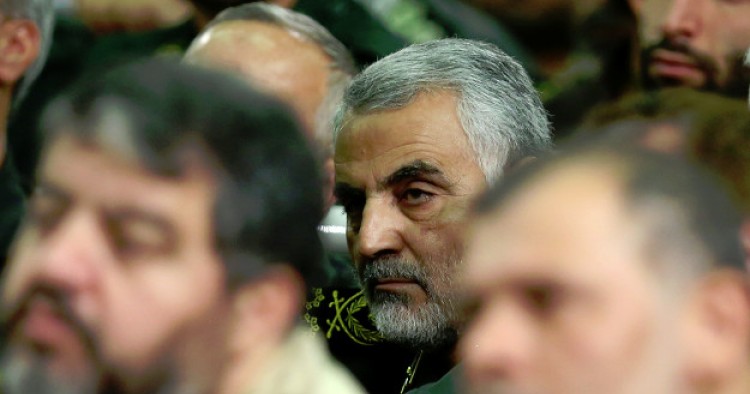Iran’s Quds Force Commander Major General Qassem Soleimani has thanked the country’s Ministry of Health for providing assistance to his forces and Iranian-controlled militiamen fighting in Syria under his command. “With this, I thank you and express my deep appreciation for the sincere efforts of your Excellency and the ministry’s public servants in providing training, medicine, and equipment, and particularly for treatment of wounded warriors,” Soleimani wrote in a letter addressed to Health Minister Seyed Hassan Qazizadeh Hashemi.
In response, Hashemi praised the role of the Quds Force commander and his forces in Syria, and thanked them for helping to release an Iranian nurse from “Takfiri” groups. Iranian leaders use the term “Takfiri” for Sunni militant groups, particularly the Islamic State but also other opposition groups fighting the regime of Bashar al-Assad. He also thanked Soleimani and his forces for fighting for Iran’s security and stability, and assured them that their sacrifices will not be forgotten.
The letters were published today by Fars News Agency, which is affiliated with the Islamic Revolution Guards Corps (I.R.G.C.).
Comment: The exchange of letters between Soleimani and Hashemi reveals that the Iranian Health Ministry plays an active role in supporting I.R.G.C.’s military efforts in Syria, including by deploying doctors and nurses to the combat zone. This is at a time when the Iranian people increasingly criticize the regime’s costly military adventurism in Syria and elsewhere at the expense of domestic priorities.
A rare video showing a university student strongly denouncing the I.R.G.C.’s role in Syria recently became an instant hit on Iranian social media. “Mr. Hassan Abbasi: Your theory is the theory of terror and horror and exporting arms and war. Your theory is supporting dictator and murderous Bashar al-Assad,” the student said to applause from the audience at the Azarbaijan Shahid Madani University. Abbasi – who is the head of an Islamic Revolution Guards Corps (I.R.G.C.) think tank called Center for Borderless Security Doctrinal Analysis – was a guest speaker at the university in Tabriz, the capital of East Azerbaijan Province. “Yes, your theory is playing with national and religious emotions of the people, and defending non-existent shrines in Homs and Idlib. What shrines are there?”
An opinion survey published last November showed that support for the Iranian regime’s involvement in the Syrian war had declined from 90 percent in 2014 to 24 percent in late 2016. As shown in this video, many Iranians now openly question the moral and strategic wisdom of a costly war in support of a brutal dictatorship in Syria. Iranian Sunnis, in particular, have recently increased their criticism of the Iranian government’s sectarian war in Syria, and many have been arrested in Khuzestan and Sistan and Baluchestan Provinces.
The Middle East Institute (MEI) is an independent, non-partisan, non-for-profit, educational organization. It does not engage in advocacy and its scholars’ opinions are their own. MEI welcomes financial donations, but retains sole editorial control over its work and its publications reflect only the authors’ views. For a listing of MEI donors, please click here.












